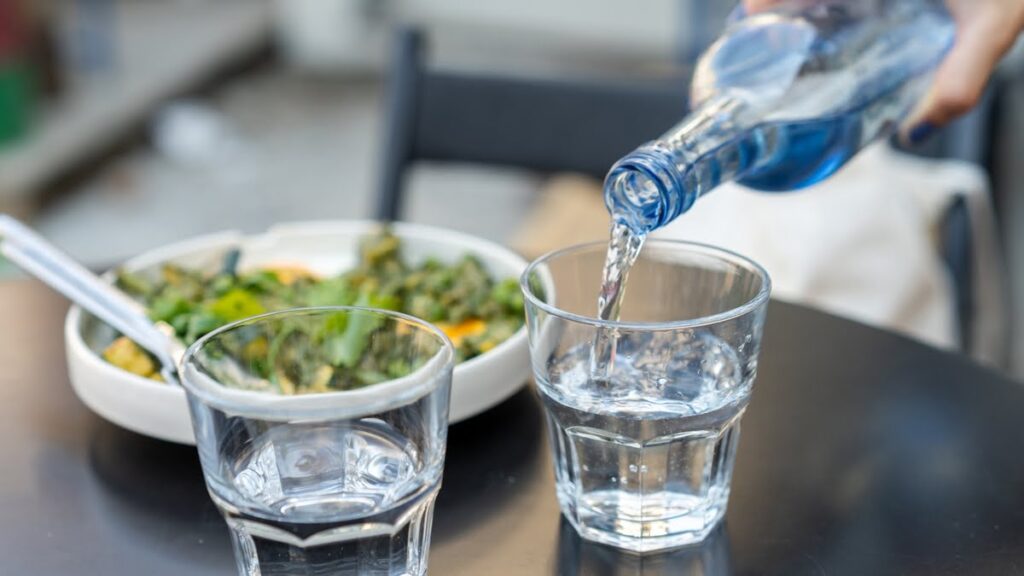
In the world of sports, where intense physical activity often leads to joint strain, natural support for the musculoskeletal system is gaining attention. One product that has long intrigued both dietitians and athletes is gelatin. Rich in valuable amino acids that are precursors to collagen – the primary component of connective tissue – gelatin is considered a potential ally in preventing overuse injuries and supporting recovery.
Although collagen in gelatin is broken down during digestion, this doesn’t mean its presence in the diet is insignificant. Studies suggest that regularly consuming collagen hydrolysates may promote the body’s own collagen synthesis, which is crucial for the health of cartilage, tendons, and ligaments.
In this article, we explore the role of gelatin in the nutrition of physically active individuals – both amateurs and professional athletes – analyzing scientific findings and the potential benefits of responsible gelatin consumption.
The Athlete’s Diet
Before examining the role of gelatin in the nutrition of active individuals, it’s important to understand the fundamentals of an optimal sports diet. Regardless of the level of advancement – whether for recreational workouts or professional training – balanced nutrition is essential. The daily meal plan must reflect each athlete’s unique energy needs, taking into account both basal metabolic rate and physical activity levels.
An active person’s diet should consist primarily of fresh, unprocessed foods rich in nutrients – vitamins, minerals, proteins, complex carbohydrates, and healthy fats. Conversely, the intake of simple sugars, trans fats, unhealthy snacks, and energy drinks should be minimized. Proper meal composition enhances physical condition, supports recovery, and boosts training effectiveness. In the context of joint health – tendons, ligaments, and cartilage – it is also important to provide collagen-rich proteins, such as gelatin.
Nutritional Requirements in an Athlete’s Diet
The body of a physically active person operates at a heightened pace, which results in increased demands not only for energy but also for essential nutrients. A well-balanced diet should support recovery processes, muscle development, and the maintenance of proper body weight and endurance. Therefore, a sports nutrition plan must provide optimal amounts of protein, carbohydrates, and fats, adjusted to the type of sport and training intensity.

Protein in the Athlete’s Diet
For individuals who do not train, daily protein intake typically ranges from 0.7 to 1 gram per kilogram of body weight. Among athletes, this requirement increases significantly and may range from 1.2 to even 3.1 g/kg of body weight. This is especially true in strength-based or power-speed disciplines, where the body uses more protein for muscle fiber repair and training adaptation. An athlete’s diet must therefore include high-quality sources of protein, such as eggs, dairy products, lean meats, fish, and collagen-based products.
Carbohydrates in the Athlete’s Diet
Carbohydrates serve as a primary energy source during physical activity. Depending on the level of exertion, intake can range from 3-5 g/kg of body weight for light training to 8-12 g/kg during intensive endurance sessions. A sufficient supply of carbohydrates helps maintain glycogen stores in muscles and the liver, improving workout performance and reducing recovery time.
Fats in the Athlete’s Diet
Although fats provide the highest energy yield per gram, their role in an athlete’s diet is typically moderate – especially in high-intensity sports. The recommended fat intake ranges from 15% to 35% of daily energy needs, which corresponds to about 0.7-1.5 g of fat per kilogram of body weight. Healthy fats – particularly unsaturated fatty acids – support hormonal balance, vitamin absorption, and overall physical health.
Minerals in an Athlete’s Diet
Adequate intake of minerals is essential for athletic performance and adaptation to intense training. Micro- and macroelements play crucial roles – they participate in metabolic reactions, regulate water-electrolyte balance, influence muscle function, and support recovery. Physically active individuals often require higher levels of certain minerals, especially in endurance or strength disciplines.
Calcium and Iron – Nutrients of Special Importance
Calcium is vital for the proper function of the skeletal and muscular systems. A deficiency may reduce bone density and impair muscle contraction. While physical activity can enhance bone mineralization, it may also lead to calcium loss – for example, through heavy sweating. Including dairy or plant-based calcium sources in the daily diet is important for athletes.
Iron plays a key role in oxygen transport and energy metabolism. Physically active women are particularly at risk of iron deficiency, which may result in decreased endurance and chronic fatigue. An athlete’s diet should include both heme iron sources (e.g. meat, fish) and non-heme iron sources (e.g. legumes, whole grains), ideally combined with vitamin C, which boosts iron absorption.
Magnesium, Potassium, and Sodium – Electrolyte Balance
Physical activity leads to increased loss of electrolytes such as magnesium, potassium, and sodium, which regulate fluid balance and influence neuromuscular function. A deficiency in these minerals may cause muscle cramps, irregular heartbeat, or decreased performance. A balanced diet rich in vegetables, fruits, whole grains, nuts, and seeds typically provides adequate amounts of these electrolytes without the need for supplementation.
Supplementation in an Athlete’s Diet – When Is It Justified?
In most cases, a well-structured diet tailored to training intensity eliminates the need for additional mineral supplements. Exceptions include situations confirmed by diagnostic testing that reveal actual deficiencies. In such cases, supplementation should be initiated only after consulting a sports dietitian or physician, who can assess the body’s individual needs.
Water in an Athlete’s Diet
Proper hydration is one of the foundations of effective training and recovery. While water plays an important role in everyone’s diet, its significance increases even more for physically active individuals. During exercise, the body loses fluids through sweat, which can disrupt electrolyte balance and lower performance.

Even mild dehydration can negatively affect concentration, motor coordination, thermoregulation, and metabolic efficiency. That’s why it is essential to replenish fluids regularly – before, during, and after a workout.
- For moderate workouts lasting under 60 minutes, mineral water – ideally rich in magnesium, sodium, and calcium – is usually sufficient.
- For longer or more intense sessions, isotonic drinks may be beneficial, as they not only replenish fluids but also provide electrolytes and carbohydrates, helping maintain metabolic and energy balance.
Post-exercise hydration is critical to restoring water-electrolyte balance. The body needs more than just water – it also requires sodium, potassium, and chloride, which are lost in sweat. During intense training in high temperatures, fluid losses can reach several liters, so a strategic hydration plan is essential.
Drinking fluids regularly throughout the day protects the body from chronic dehydration, which can impair energy levels, slow recovery, and increase the risk of injury.
Gelatin for Athletes
Gelatin is a protein-based product obtained through the hydrolysis of collagen found in animal skin, tendons, and bones. While many people associate it primarily with desserts, its applications are much broader – it appears in broths, stocks, food products, as well as in supplements and medications. From a sports nutrition perspective, gelatin is gaining attention as potential support for the musculoskeletal system, especially in terms of connective tissue recovery.
Gelatin contains numerous amino acids – most notably glycine and proline, which are essential for the body’s production of endogenous collagen. Importantly, dietary collagen doesn’t directly reach joints or cartilage because – like all proteins – it is broken down in the digestive tract into individual amino acids. However, that doesn’t make it ineffective. Regular intake of proline may aid regenerative processes and strengthen connective tissue structures, which is especially relevant in the context of physical strain.
How Does Gelatin Help Athletes?
Intense training leads to microdamage in muscle fibers and an increased need for collagen in joints and tendons. In such conditions, the body requires more of specific amino acids to support repair and maintain the integrity of structural tissues. Gelatin, as a readily absorbable source of amino acids, can complement a balanced sports diet – especially in endurance and strength-based disciplines.
When Should Athletes Consume Gelatin?
Gelatin may offer the greatest benefits during periods of increased physical strain, when joints and tendons are under significant load. This applies to both professional athletes and recreational exercisers who have intensified their training routines.
Those most prone to overuse injuries include runners, bodybuilders, strength athletes, and endurance competitors.
Incorporating gelatin into the diet may support recovery following injuries such as ligament strains, joint sprains, or muscle microtears. During such times, the body’s demand for amino acids crucial for tissue repair increases. For this reason, gelatin is also recommended as part of a recovery strategy after injuries or in cases of overuse-related pain.
The most effective time to consume gelatin appears to be pre- or peri-workout, especially when paired with vitamin C, which plays a role in collagen synthesis. This combination may enhance the bioavailability of key amino acids and support faster recovery of joints and ligaments. Still, it’s important to remember that gelatin cannot replace a balanced diet, although it may be a valuable supplement during intense training cycles.
Is All Gelatin Suitable for Athletes?
While gelatin is a versatile product, not every form offers real benefits to physically active individuals. Many popular items – such as fruit jellies, sweetened gummy candies, or aspic dishes – contain only small amounts of actual gelatin, while being rich in undesirable additives like sugar, saturated fats, and preservatives. Regular consumption of such foods can promote inflammation and interfere with recovery, especially when eaten frequently.
For athletes, the most important component is proline – an amino acid that plays a crucial role in collagen regeneration and connective tissue flexibility. To have a measurable effect on joint recovery, the body needs at least 4 grams of proline per day. Meanwhile, an average portion of jelly (e.g. 200 g) contains only about 2.5 g, which is not sufficient to meet the needs of someone training intensively.
That’s why it’s best to choose pure food-grade gelatin in powder or granule form, without added flavorings, colorants, or sugar. When dissolved in warm water and combined with a splash of lemon juice (a source of vitamin C), it becomes a practical and valuable dietary support for athletes.
Is Gelatin Alone Enough for Post-Workout Recovery?
Gelatin can support tissue repair, but it’s not a substitute for complete recovery after physical exertion. Although it contains valuable amino acids like proline and glycine, these should be complemented with other protein sources – both animal and plant-based. Alternatives such as poultry, eggs, fish, lentils, or chickpeas provide a full amino acid profile, which is essential for cellular repair and joint structure reinforcement.

Collagen synthesis also requires the presence of key micronutrients and vitamins. Among the most important is vitamin C, which activates enzymes responsible for producing collagen fibers. Without it, the effectiveness of dietary gelatin drops significantly. Other vital elements include vitamin B6, magnesium, calcium, and trace minerals like boron, which help maintain healthy connective tissue and bone mineralization.
Diet quality plays a critical role. Foods that promote inflammation – such as highly processed products, excessive sugar, trans fats, or meals fried in refined oils – can impair the body’s ability to recover. Including anti-inflammatory ingredients, such as fatty sea fish, flaxseed, leafy greens, or spices like ginger and turmeric, may enhance the body’s natural repair mechanisms.To sum up – gelatin can be a beneficial addition to an athlete’s diet, but only as part of a broader nutrition strategy that includes balanced meals, proper hydration, and micronutrients with high bioavailability. Only this kind of approach can effectively support recovery after intense training.



